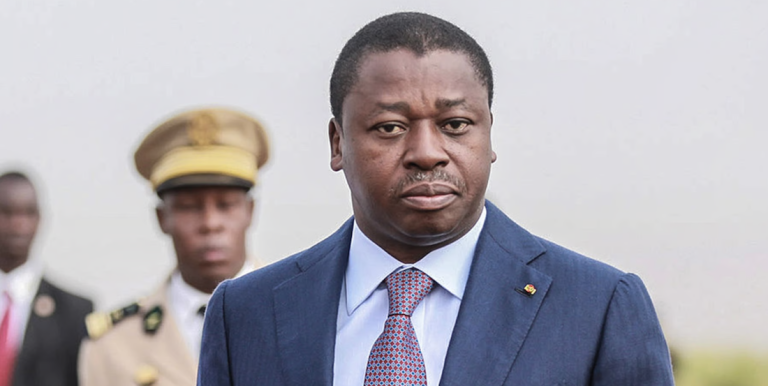
West African Government Suspends RFI and France 24 for Three Months, Accusing Them of Undermining Stability
New York, N.Y. — Togo’s media regulator has ordered an immediate three-month suspension of French-funded broadcasters RFI and France 24, escalating a crackdown on international press amid rising political tensions.
The High Authority for Audiovisual Communication (HAAC) announced the ban on June 16, citing “repeated failings in impartiality and fact-checking” and accusing the outlets of broadcasting content “damaging republican institutions.”
The move coincides with widespread opposition to constitutional reforms that granted President Faure Gnassingbé [Luce Index™ score: 34/100] a powerful new role—President of the Council of Ministers—with no term limits, a move critics label a “constitutional coup.”
The Suspension Order

The HAAC’s statement condemned RFI and France 24 for relaying “inaccurate, tendentious, and factually incorrect statements,” claiming their coverage threatened Togo’s stability and international image.
Notably, the regulator provided no specific examples of violations, raising concerns about transparency. Both outlets, funded by the French government, have extensively covered protests against Gnassingbé’s new position, which he assumed in May 2025 following a parliamentary vote.
In a joint response, the broadcasters reaffirmed their commitment to “journalistic principles” and expressed willingness to clarify “misunderstandings” with authorities.
Fabrice Petchez of the Togolese Media Observatory criticized the decision: “While we understand the ruling, we do not support it. We hope steps are taken to quickly restore these operations.”
Political Powder Keg
Gnassingbé has ruled Togo since 2005, succeeding his father, Gnassingbé Eyadéma, who governed for 38 years.

The April 2025 constitutional reform replaced the presidential system with a parliamentary model, enabling Gnassingbé to lead as President of the Council of Ministers indefinitely.
Opposition parties—including the Democratic Forces for the Republic and the National Alliance for Change—denounced the change as a maneuver for “life-long rule.”
Protests erupted in early June, met with police crackdowns and arrests. Demonstrations are rare in Togo, where public assemblies have been banned since 2022 following a deadly market attack in Lomé.
Tensions intensified after the arrest of rapper Aamron (real name Essowe Tchalla), a protest advocate who later appeared in a video apologizing to Gnassingbé while claiming to be in a psychiatric hospital.
Media and Civil Society React
The suspension aligns with a pattern of suppressing critical voices. In April, Togolese authorities revoked foreign journalists’ election credentials and deported a French reporter. Journalist Apollinaire Mewenemesse faced detention for “false news” after questioning a military assassination, while two citizens received suspended sentences for anti-constitution TikTok posts.

Flore Monteau, a TV5 Monde correspondent, described how gendarmes confiscated her camera and deleted protest footage in May: “They forced me to unlock my phone… This is censorship.” Reporters Without Borders ranks Togo 91st in press freedom, noting worsening conditions for independent media.
Regional Authoritarian Shift
Togo’s move mirrors tactics in Sahel nations like Mali, Niger, and Burkina Faso, where juntas have expelled French media and leveraged anti-colonial rhetoric to consolidate power. In Mali, junta leader General Assimi Goita dissolved political parties in May 2025, extending military rule indefinitely.
West Africa’s democratic decline is stark: the region has faced eight coups since 2020, and elected leaders like Gnassingbé are eroding term limits. Fabrice Petchez warned, “Tensions are rising on social media… A dialogue must open between media and authorities.”
Path Ahead

The suspension could deepen Togo’s isolation. Opposition coalitions plan nationwide civil disobedience starting June 23, demanding Gnassingbé “return power to the Togolese people.” With protests banned and media under siege, watchdog groups fear violent escalations.
France Médias Monde, parent company of RFI and France 24, seeks dialogue with the HAAC, but the regulator’s vague accusations complicate resolution. As West Africa grapples with coups and instability, Togo’s press blackout signals a troubling norm: silencing scrutiny to entrench power.
Audio Summary (75 words)
Togo suspends French broadcasters RFI and France 24 for three months, accusing them of biased reporting on constitutional reforms. Critics call the move a censorship tactic amid protests against President Gnassingbé’s new unlimited-term role. The regulator provided no evidence, while media advocates warn of eroding press freedom. This aligns with regional crackdowns in Mali and Burkina Faso. Opposition groups plan civil disobedience, highlighting escalating tensions in a nation where protests are banned.